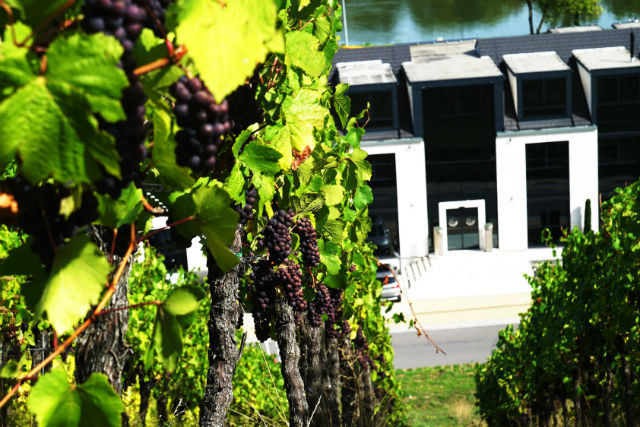Before establishing its European headquarters in Schengen in 2015, German nutritional supplements and cosmetics firm PM International was struggling to expand.
Three years later, and as it marks 25 years of operations, it can hardly keep up with the pace of growth.
“We moved here three years ago with 23 people. Today, it’s 78,” company CEO Rolf Sorg says. “We’re negotiating with the commune because we’ve run out of space. I’ve bought land the other side of the road where we plan to construct another building for 88 people.”
Part of the success, he says, comes down to the new location—just a few hours from several capital cities, the international community and R&D-friendly environment.
Schengen is not new for Sorg, who has called the Moselle town bordering France and Germany home for the past 20 years. He cites the wine, the food and lack of traffic jams as among the attractions and even has dual Luxembourg nationality.

Photo: PM International. Company CEO Rolf Sorg, pictured, has lived in Schengen for the past 20 years
High standard of living
He wants employees to be able to enjoy the place as much as him, so much so that he’s in talks to construct accommodation to be offered to staff at rental prices found in bordering countries.
In addition to a good quality of life, the surrounding vineyards have also inspired Sorg. He and his team have devised a circular economy project with the Luxembourg Institute of Science and Technology (List) to extract the polyphenols, antioxidants which help combat cell damage, found in the grape remains, or pomace, and use them as an ingredient in their products. “We use this ingredient already,” Sorg explained, “But, we don’t have it sustainably.”
The Activitis project is expected to be finalised by October 2020. Based on current estimates, Luxembourg wine production alone would provide up to 2,600 tonnes of pomace per year, a little less than what is needed, but it’s a start. “It’s a win-win. We get a highly controlled premium sustainable extract. On the other side, we create an income opportunity for something that had no value before.”
The List collaboration is one of several planned over five years thanks to the establishment of a joint laboratory in Luxembourg. PM International also funds the Liab award, an international prize encouraging bioinnovation in transport and absorption of nutrients.

Photo: PM International. The Activitis project is expected to be finalised by October 2020
IT innovation
But, not all projects are biology-based. A separate project still in discussion looks at IT innovation, using artificial intelligence to find solutions for customer relationship management. “It’s about touching new ground, not what exists already,” Sorg said. He added that he was impressed by the level of support for innovative R&D in Luxembourg, and had the impression the government actively seeks partnerships to help innovation flourish. “It’s also been about connecting us with the right people,” he said.
Sorg is particularly excited about the product development side, though his background is in sales. “I grew up in a family of entrepreneurs. My father constructed conveyor belts to transport the sand out of lakes. My grandfather had a cannery,” he explained.
As a young man he dabbled in car mechanics before discovering direct sales for cosmetics while at university. “I took one semester off to find out how much I could make. I never went back,” he laughed.
On a mission
When liquidity problems forced the company he worked for to close in 1993, Sorg invested everything he had and took out loans to buy up the cosmetics stock of bankrupt companies, which he stored at his grandfather’s factory in Limburgerhof. In 1995, he branched out into nutritional supplements. “There was a huge discussion about whether it’s needed or not,” he said, adding: “When I entered the market, I felt like a missionary on a mission because so many people opposed it.”

Photo: PM International. The List team with, far right, PM Internatinoal chief scientific officer Dr Tobias Kühne
But, attitudes have changed dramatically in the last 18 years. In 2016, the global market was estimated to be worth $133 billion, a figure that is expected to grow to $278 billion by 2024. PM International expects to seize a large part of that, expanding beyond its core markets in Germany, Scandinavia, Switzerland, Austria, Japan, South Korea and Hong Kong. In the past three years, it opened operations in the US, Mexico and Chile. “In 2019, our plans are Vietnam, the UK, Canada and Brazil.”
China expansion
But, the biggest coup will be further afield, in China. “In direct sales, it’s the second-largest market in the world […] It’s the second-largest economy and looks to take over the US in the next two years.” But it is not without its challenges. Sorg’s team has been working on the expansion for five years. They have two products already licensed in China, focused mainly on children’s nutrition.
But PM International faces further bureaucratic hurdles, the biggest being the expectation by the Chinese authorities that they manufacture in China. “Our brand has always been ‘made in Germany’. We need to find a way to create manufacturing experience in China to their specifications and to stay with the quality we are used to delivering,” Sorg explained. He was upbeat that a solution would be found with contract manufacturers in China and further jobs could be created there off the back of the expansion.
